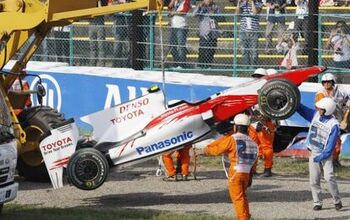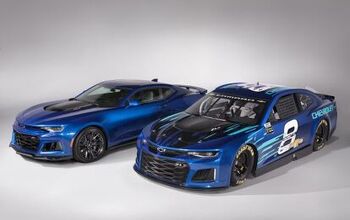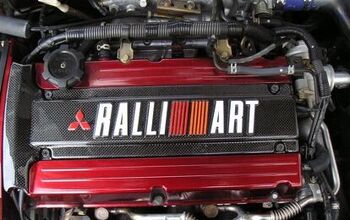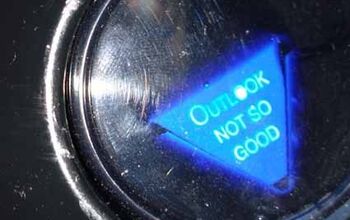Quote Of The Day: Win On Sunday, Sell On Monday Edition
New vehicle buyers who are influenced by motorsports typically love cars and trucks and they are opinion leaders for other car buyers – they give an average of 25 or more vehicle recommendations per year to others. More importantly people follow their advice – and we have measured it. So, there is a downstream impact from the races in the form of on-going word of mouth recommendations. That’s why we say that the roar from a race car continues away from the track.
Steve Bruyn, President of Foresight Research breaks down an intriguing finding from his firm’s “2010: Automotive Marketing Return On Investment” study [via PRNewswire]. What makes Foresight’s finding so strange is that from Formula One to NASCAR, OEMs have been grumbling about the irrelevance of major race series to their automotive products. Meanwhile, there’s no shortage of anecdotal evidence to suggest that automotive enthusiasm is on the decline in general, a reality which implies that racing is less important to automotive buying decisions than ever. So just how effective is the oldest form of automotive marketing?
Ironically, Foresight singles out the race series that have come under the greatest OEM pressure of late as examples of effective race-based auto marketing.
When it comes to the influence of various racing organizations, NASCAR, Formula 1 and IndyCar are heavy favorites. Geography also played a key role in the study with markets like Charlotte, Orlando/Daytona, Dallas and Northern California all more likely to attend a race and/or watch on TV. The incidence of TV viewership by brand was led by Dodge (36%), GMC (35%), Chevrolet (32%) and Ford (31%) followed by upscale and performance oriented brands. Buyers of large cars, sporty cars and pickup trucks are more likely to be influenced by motor sports.
OK, so those are the most popular racing series with American audiences… but what percentage of car buyers actually watch them?
In 2009, 10% of all new vehicle buyers surveyed attended one or more motorsports races in the 12 months prior to their purchase. Meanwhile, 25% of all new vehicle buyers surveyed watched at least one motorsports race on television in the same time period. Of those who watched motorsports on TV, the average number of races watched was a surprisingly high 11.
But Foresight only quantifies the real impact on the ten percent of car buyers who actually attend races. As Bruyn explains
When marketers have a display at a race, 63% of those highly influential buyers actually pre-planned their visits to include vehicle brand displays at the motorsports venue. These folks are there for the race but when they’re in the market for a new vehicle they take the opportunity to visit the display. There may not be a huge number of shoppers at any given race but there are definitely enough to make the race day pay off. Then after the race, they are far more inclined to spread vehicle recommendations versus the total market average (44% versus 18%, respectively).
Now, ten percent of the market isn’t something to be ignored, but with race fans statistically distributed in regional clusters, a market-wide commitment to motorsport still seems like a questionable move for mainstream brands. Perhaps then, the benefit of racing series like NASCAR is that it’s relatively cheap, and can be followed or ignored, depending on the consumer. On the other hand, if NASCAR’s vehicles only superficially resemble a brand’s road cars, one has to wonder how long the halo effect can last.
More by Edward Niedermeyer
Latest Car Reviews
Read moreLatest Product Reviews
Read moreRecent Comments
- RHD The analyses above are on the nose.It's a hell of a good car, but the mileage is reaching the point where things that should have worn out a long time ago, and didn't, will, such as the alternator, starter, exhaust system, PS pump, and so on. The interiors tend to be the first thing to show wear, other than the tires, of course. The price is too high for a car that probably has less than a hundred thousand miles left in it without major repairs. A complete inspection is warranted, of course, and then a lower offer based on what it needs. Ten grand for any 18-year-old car is a pretty good chunk of change. It would be a very enjoyable, ride, though.
- Fred I would get the Acura RDX, to replace my Honda HR-V. Both it and the CRV seats are uncomfortable on longer trips.
- RHD Now that the negative Nellies have chimed in...A reasonably priced electric car would be a huge hit. There has to be an easy way to plug it in at home, in addition to the obvious relatively trickle charge via an extension cord. Price it under 30K, preferably under 25K, with a 200 mile range and you have a hit on your hands. This would be perfect for a teenager going to high school or a medium-range commuter. Imagine something like a Kia Soul, Ford Ranger, Honda CR-V, Chevy Malibu or even a Civic that costs a small fraction to fuel up compared to gasoline. Imagine not having to pay your wife's Chevron card bill every month (then try to get her off of Starbuck's and mani-pedi habits). One car is not the solution to every case imaginable. But would it be a market success? Abso-friggin-lutely. And TTAC missed today's announcement of the new Mini Aceman, which, unfortunately, will be sold only in China. It's an EV, so it's relevant to this particular article/question.
- Ajla It would. Although if future EVs prove relatively indifferent to prior owner habits that makes me more likely to go used.
- 28-Cars-Later One of the biggest reasons not to purchase an EV that I hear is...that they just all around suck for almost every use case imaginable.

































Comments
Join the conversation
Anyone else notice that engine failure disappeared in the IRL when Honda started supplying all the engines? I know the engines have almost no connection to Honda consumer products, but I think Honda uses the IRL to send the message that they know their stuff when it comes to engineering internal combustion engines. http://racing.honda.com/hpd/about.aspx
Ferrari, Lotus, Williams, BRM, McLaren, Benetton (a clothing manufacturer, fer chrissake), Brabham, etc. All are cottage-industry operations, and all have participated in F1. Large companies like Renault, BMW and Honda are rare in the annals of Formula 1 and even Ford only stuck its name on a Cosworth engine. Of those biggies I mentioned, only Renault and briefly Honda ever fielded a complete car and not just an engine. However, technologies developed in F1 do trickle down to production cars, maybe more so than in any other racing series. Credit improvements in aerodynamics, electronic engine management, , transmissions, driver aids like traction control and ABS, metallurgy, structural design, and many others to lessons learned in F1 over the last 30 years alone. The car in your driveway benefited more from F1 tech than it ever got from NASCAR. NASCAR, on the other hand, has always been really good at presenting its form of racing as FUN. The most common complaint about F1 these days is that it's too clinical. NASCAR, on the other hand, has always been big on personalities.